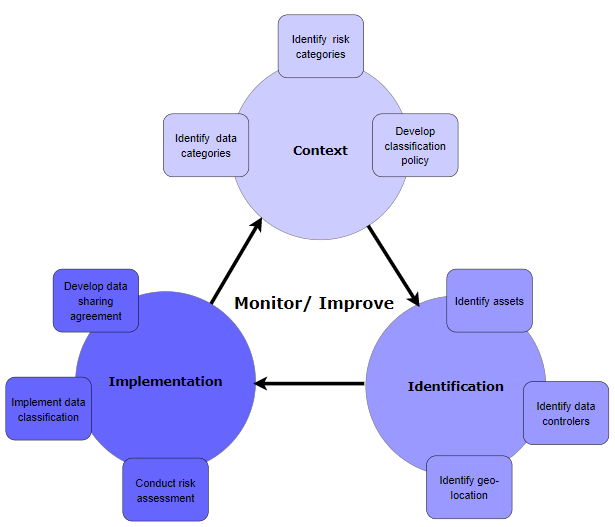The challenges are present in most phases of the data management, as in a smart city, data is collected from various sources (sensors, smart meters, smartphones, CCTV cameras, etc.) from different manufacturers, which causes a problem when integrating data. A data lifecycle is a framework containing all the sequential stages and activities that data has to go through from its creation, processing, archival and/or disposal (El Arass et al. 2017). Privacy and security are other factors that concern not only the cities but also their citizens, as they have their data collected and stored. These and other factors make the data lifecycle essential in order to provide better management of the data in a smart city. Data classification is the act of classifying data into categories, therefore it can be protected more effectively based on the data requirements (Digital Guardian, nda) (Carnegie Mellon University, 2018).
Conduct Data Lifecycle and Classification

Before conducting the data classification, it is necessary to follow the steps below:
Activities
- Specify City Service Domain
- Specify City Service
- Define Stakeholders
- Define Data Sources: Define the data sources from where the data will be collected.
- Define Data Input/Output: Specify the data input and output for all the process from a specific service.
- Conduct Data Classification: Conduct the data classification using the data classification framework (see fig. 1).
- Define Data Lifecycle Phases/Activities
Template
Data Entity Template available to download
References
- British Standard. BS 10010:2017, Information classification, marking and handling.
- Carnegie Mellon University. Information Security Office, 2018. Available at https://www.cmu.edu/iso/governance/guidelines/data-classification.html.
- Digital Guardian (n.d.a.). The Definitive Guide to Data Classification. Available at: https://digitalguardian.com/resources/whitepaper/definitive-guide-data-classification.
- El Arass, M., Tikito, I. & Souissi, N., 2017. Data lifecycles analysis: Towards intelligent cycle. In Intelligent Systems and Computer Vision (ISCV), Fez, pp.1-8.
- Gharaibeh, A., Salahuddin, M., Hussini, S., Khreishah, A., Khalil, I., Guizani, M. & Al-Fuqaha, A., 2017. Smart Cities: A Survey on Data Management, Security and Enabling Technologies. In IEEE Communications Surveys & Tutorials, vol. 19, no. 4, pp. 2456-2501.
- ISO/IEC 27001:2005 – Information technology — Security techniques — Information security management systems — Requirements.
- ISO/IEC 27005:2008 – Information technology — Security techniques — Information security risk management.
- NIST, FIPS PUB 199, 2004. Standards for Security Categorization of Federal Information and Information Systems.